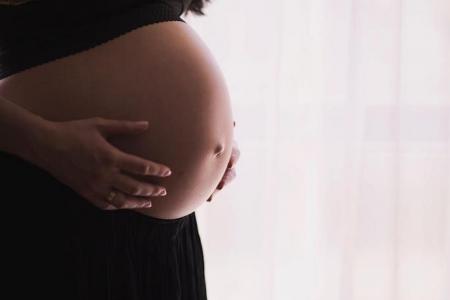Covid-19 shot during pregnancy cuts baby’s risk of death by almost 80%: Study
Babies whose mothers got an mRNA Covid-19 vaccine during pregnancy have a lower risk of neonatal death and neonatal intensive care admission, new research has found.
This finding from a large-scale study in Ontario, Canada, of more than 142,000 live births was published in the Journal of the American Medical Association (Jama) in October.
It found that compared with infants whose mothers had not received the Covid-19 vaccine, the 85,670 infants whose mothers had received at least one mRNA vaccine during pregnancy had 14 per cent lower risks of severe morbidity, 78 per cent lower risk of death and were 15 per cent less likely to need intensive care in the first 28 days of their lives.
The study, which followed the infants till the age of six months, found no adverse effects from the vaccine.
Doctors here were fully supportive of women getting the Covid-19 vaccine or booster shots during pregnancy.
Neither KK Women’s and Children’s Hospital (KKH) nor the National University Hospital (NUH) know the vaccine take-up rate among their patients, but Singapore General Hospital (SGH) said almost all, if not all, of its patients take the vaccine.
Dr Pamela Partana of SGH’s Department of Obstetrics & Gynaecology said: “Due to the change in immunity during pregnancy, pregnant women tend to fare worse if they contract Covid-19 during pregnancy, compared to the non-pregnant cohort.”
Dr Serene Thain, a consultant in Maternal Fetal Medicine at KKH, said that during the pandemic, unvaccinated pregnant women with Covid-19 needed to be hospitalised for two or three weeks, while those who had been vaccinated could be cared for at home.
She explained that during pregnancy, women are at a greater risk of severe disease if they are unvaccinated and catch Covid-19.
“This may be due to the changes in pregnancy such as raised heart rate and oxygen intake, reduced lung capacity, increased risk for venous thromboembolism, etc,” she said.
Venous thromboembolism, or blood clots in the veins, could result in a clot in the lungs, which blocks blood flowing through. This, Dr Thain said, “could be potentially life-threatening”.
She also said Covid-19 vaccines generate antibody production in pregnant women that can be conferred on their baby, thereby reducing the likelihood of Covid-19-related hospitalisation and serious complications among infants aged six months or younger.
Dr Yung Chee Fu, a senior paediatric infectious diseases consultant at KKH, added that vaccination not only protects pregnant women against severe disease, but also against poor delivery outcomes.
Dr Low Jia Ming of the Khoo Teck Puat – National University Children’s Medical Institute said: “There is solid scientific evidence that the benefits of receiving the Covid-19 vaccination during pregnancy far outweigh the risks.”
Almost 90 per cent of people here have received at least one dose of Covid-19 vaccine, and just over 80 per cent have had the three jabs Singapore considers confers minimum protection.
An editorial that accompanied the article in Jama said pregnant women should protect themselves and their babies by getting not just the Covid-19 vaccine, but also the Tdap shot, and vaccines against influenza and the respiratory syncytial virus (RSV).
The Tdap vaccine protects against tetanus, or lockjaw; diphtheria, a serious infection of the mucous membrane that also leads to problems with heart rhythm and death; and acellular pertussis, also known as whooping cough.
RSV is an infection of lungs and the respiratory tract that is usually mild, but can be extremely severe in infants.
In Singapore, both the influenza and Tdap vaccines are recommended for pregnant women, but the maternal RSV vaccine is not one of the vaccines recommended during pregnancy.
The editorial said that during the 1918 Spanish influenza pandemic, 50 per cent of infected pregnant women died. And, during the 2009 H1N1 influenza pandemic, infected pregnant women in the United States were seven times more likely to need intensive care compared with those who were not pregnant.
Dr Partana said: “Due to the change in immunity during pregnancy, influenza can be a serious infection, or in some rare cases, life-threatening, for pregnant women and their babies.”
Associate Professor Citra Mattar of NUH’s Division of Maternal Fetal Medicine said most vaccinated pregnant women develop a high level of protective antibodies that are transferred efficiently to the baby before birth.
So, a mother getting a Tdap vaccine helps boost the newborn baby’s immunity to whooping cough, a potentially serious infection in infancy which the baby can acquire from other members of the household, she said.
Singapore’s national childhood immunisation schedule recommends that infants be given the first Dtap vaccine jab – similar to Tdap, but for children – at the age of two months.
Dr Partana added that mothers getting the Tdap vaccine during pregnancy “is the only way to protect their baby from getting whooping cough in the first two months of their life until they are old enough to have their own vaccine”.
The maternal RSV vaccine was approved for use in the US in September.
The Jama editorial said that early clinical trials showed that the maternal RSV vaccine effectively prevents severe and life-threatening RSV infection in newborns, as antibodies are actively transferred from the mother.
Although RSV is common, easily contagious and usually mild, it is the most common cause of bronchitis and pneumonia in infants under the age of one year.
An article in The Lancet journal in 2022 said one in 56 healthy infants across five unnamed European countries is hospitalised for RSV in their first year, with most of them below the age of three months.
A study by KKH found that between 2005 and 2013, the hospital had an average of 16 RSV admissions a week for children below the age of 30 months. It accounted for 47 per cent of bronchiolitis and pneumonia admissions among children below the age of six months.
Get The New Paper on your phone with the free TNP app. Download from the Apple App Store or Google Play Store now


